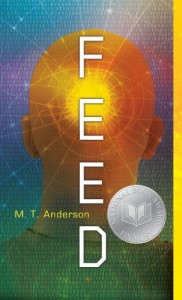 This sci-fi novel is addressed to “young adults” defined as aged 14 and up. It was recommended to me for reasons I can no longer remember. I don’t read or write YA fiction, so I have to give allowance for a domain I am not very familiar with, but I have to say, this book seemed heavy-handed, simplistic, pandering, obvious, and downright insulting to any 14-year-old with the intelligence and motivation to read a sci-fi novel. It’s been a long time since I was fourteen, but I can’t imagine I would ever have found a book like this enjoyable. That said, the book is a National Book Award Finalist, so I’m the odd one out.
This sci-fi novel is addressed to “young adults” defined as aged 14 and up. It was recommended to me for reasons I can no longer remember. I don’t read or write YA fiction, so I have to give allowance for a domain I am not very familiar with, but I have to say, this book seemed heavy-handed, simplistic, pandering, obvious, and downright insulting to any 14-year-old with the intelligence and motivation to read a sci-fi novel. It’s been a long time since I was fourteen, but I can’t imagine I would ever have found a book like this enjoyable. That said, the book is a National Book Award Finalist, so I’m the odd one out.
The story is set in a dystopian technological future earth where all the children have an electronic brain implant at birth so they can receive “The Feed” directly into their thoughts for the rest of their lives. The Feed comprises advertising and infotainment, much like today’s internet and television. The Feed also allows the kids to communicate “telepathically,” which is to say in chat networks, again, much like today’s social media. Considering the state of the media world before 2002, when the book was published, Anderson was prescient in his vision. (The first smartphone was only released in 2007. Facebook only went public in 2012).
Also a plus is Anderson’s creation of a slangy teen dialect that, while contrived, feels mostly believable and is a source of much humor in the book. The kids call each other Unit! Instead of “Dude!” but the syntax is the same. It’s difficult to create a good artificial dialect. Anthony Burgess did it memorably well in “A Clockwork Orange.” Anderson has produced an admirable and enjoyable language context here.
On the down side, the author’s criticism of consumerist society is overdone and heavy-handed. The author seems appalled at ubiquitous advertising in society, but my feeling is that most people, especially teenagers, do not accept it at face value as his characters do. Kids are not “slaves” to advertising. It is more of an annoyance and an amusement than an oppression, unless you dig deeper into the pernicious subterranean roots of manipulation as Don DeLillo did, for example, in “White Noise.”
Anderson’s teen characters are utterly vapid however, without original thoughts, opinions, or ambition. They go to School™ but don’t seem to study anything there, read any books, have any ideas, or learn anything. Maybe that’s how it is these days, but I think that’s just another example of the author’s heavy-handed attempt at satire, which falls flat, as far as I’m concerned.
A more serious literary criticism is that with uninteresting and uninterested characters who are directionless and think only of drinking (and puking), having sex, wearing the latest fashions and driving a fancy car, the story very quickly becomes boring because nothing happens. There is no plot and no character development, no tragedy, no striving, no quest, no challenge, no hero’s journey. What does that leave? No much of anything.
There is a hint of a story in there. Violet, the main character’s female friend, received her brain implant late in life and was home-schooled, so she is somewhat eccentric and dares to protest the empty-headed lifestyle of her peer group. But aside from the occasional rant, she does nothing about it and falls in with their ways, and nothing interesting comes of her special situation. That was a huge lost opportunity. Hundreds and hundreds of boring, repetitive pages of nothingness could have been filled with dramatic tension and intellectual-social conflict.
I believe any thinking YA reader would be offended by the author’s unrelenting ridicule of teen vapidity in this novel. Sure, there’s a lot of that on the ground, but those people aren’t reading novels. Maybe that’s how it’s supposed to work: Those other kids are stupid, but not me.
But Unit! Like, what do I know? This book’s successful and I’m not.
Anderson, M.T. (2002). Feed. Somerville, MA: Candlewick Press (298 pp).
